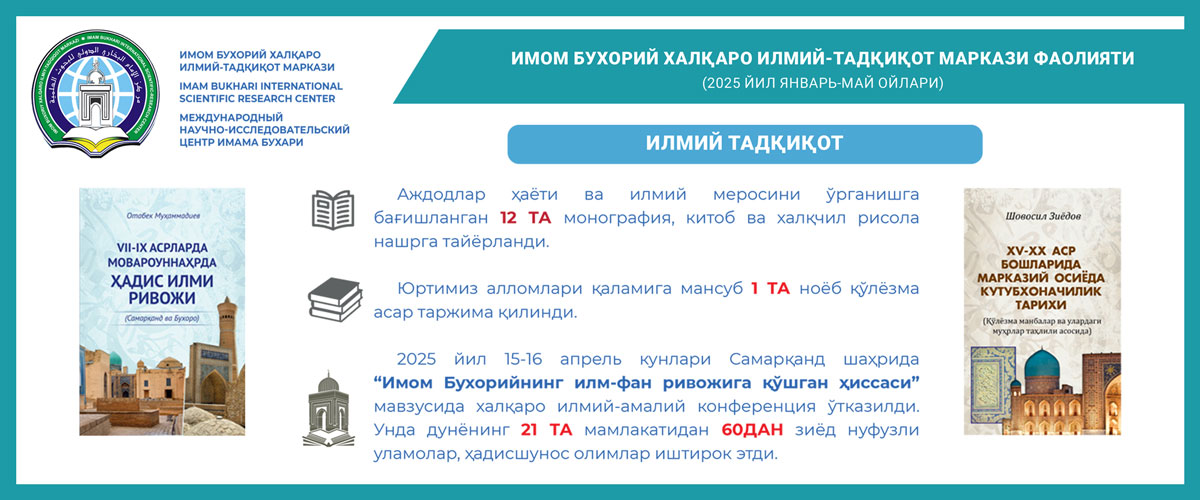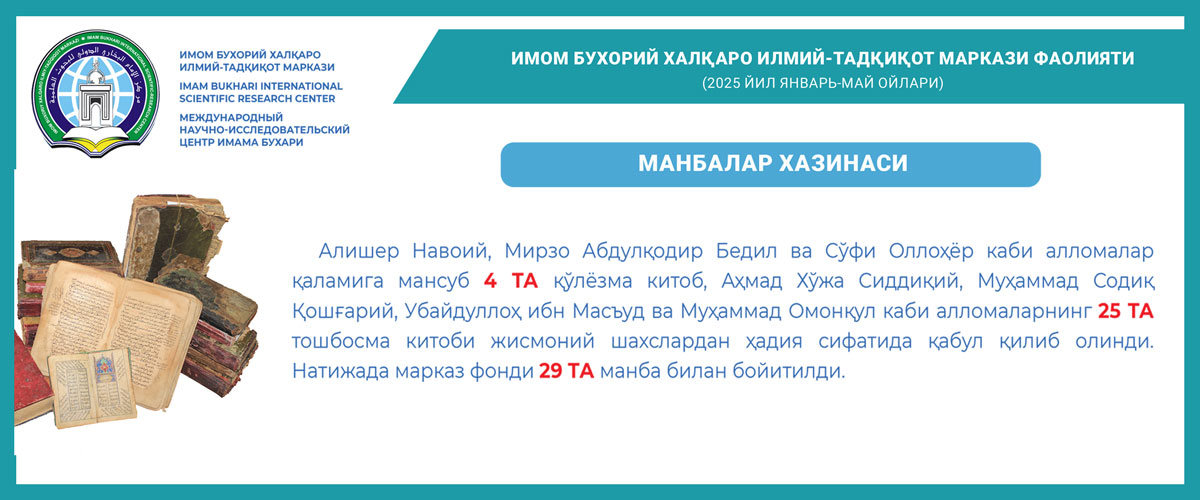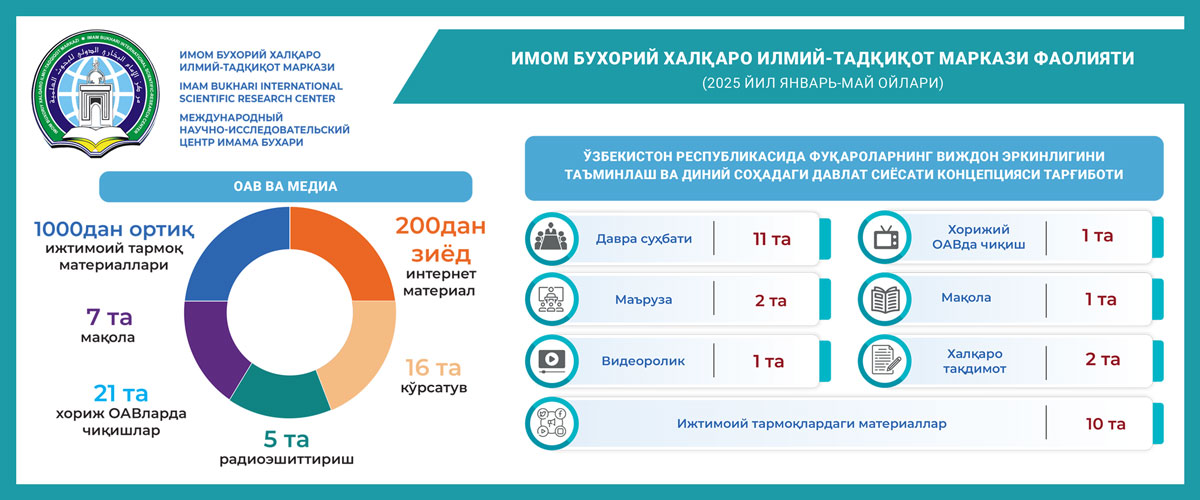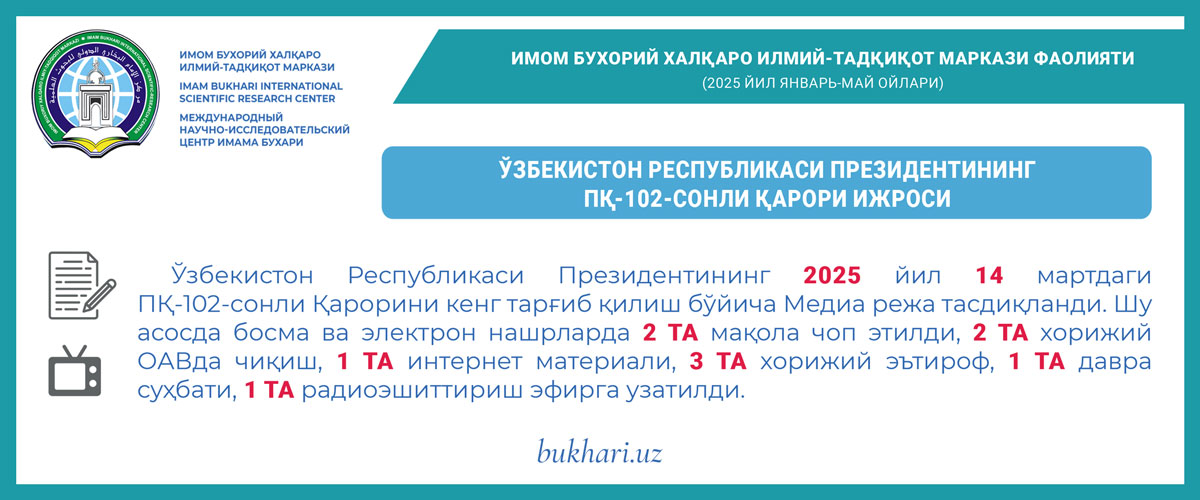The sources inform us about the ability of Abu Bakr Qaffal ash-Shashi to create verses. The historian Tajiddin Subki provides in his book “Tabaqat ash-Shafi’iya al-Kubra” some lines from the poetry of Qaffal ash-Shashi in which he says:
My house is always open for my guests,
My meal is halal, you may come to me,
I present with all I have at my disposal,
We have vinegar and greens, you look at my table,
Kind-hearted people will be satisfied,
I am indifferent to those who are unkind.
The meaning of these verses written in a nice Arabic language was translated by Doctor A. Irisov in the following lines: “If someone comes to my house as a guest, my table is always open and full for him. If my guest eats something from my table, he must be sure that I have earned my meal by my pure labour. I offer everything I have at my disposal to my guest. If I have nothing to offer him, so I offer him vinegar and greens. In this case if he is a man of kind heart, he will not be offended of me, if he is not an open-hearted one, so am I unable to cure him”.
The historian Tajiddin as-Subki’s book “Tabaqat ash-Shafi’ia al-Kubra” contains some interesting information dealing with the di plomatic correspondences between the Emperor of Byzantium and Arab Caliphate. This question is described in detail in Sheikh Abu Ahmad Muhammad Qazi Shashi’s book titled “Silsilat al-arifin” (Dynasty of Those Who Acknowledged Allah). Sheikh Abu Ahmad Muhammad Qazi Shashi was a devoted student and follower of His Excellency Khoja Nasiriddin Ubaydullah Akhrari Vali.
As has been mentioned above, Qaffal ash-Shashi visited some countries of the Islamic world in search of knowledge and enlightenment. He often visited Mecca with the purpose of pilgrimage and on the way back home, he used to stay for some time in Baghdad and, with the purpose of improving his knowledge, have discussions and debates with the scholars of Baghdad. Once he happened to visit Baghdad when a military commander-in-chief of Byzantium Taghfur made an invasion and occupied the territoiy of the Northern part of Syria and Antakya, which belonged to the caliphate of the Abbasids, and terrified the territory of the capital city of the caliphate. It was in the fourth century in accord with the Islamic calendar.
According to the opinion expressed by an orientalist Bakhriddin Mannanov, the Byzantium Empire, which appeared as a result of the decline of the Roman Empire in the 4th century, developed in its own way and in the 10th century succeeded in widening its territory. Its influence spread throughout the territories of not only Balkan Peninsula and a part of Eastern Europe but also the shores of the Black Sea, Western part of the Caucasus and the Eastern part of Small Asia. Under these conditions, Constantinople tried to reinvade and occupy as much as possible the territories that belonged to Arab Cali phate. In the battles taken with this purpose, the Byzantium army succeeded and fought against the Caliphate of Baghdad and against the Islam in general. As a scene of these battles, there appeared an ultimatum — a letter written in verses which has reached us. This letter was written by Taghfur, a commander-in-chief of the Byzantium army and sent to the caliph of Baghdad.
At that time, it was usual to write letters in verses in Byzantium and Arab Caliphate. Especially, diplomatic letters were often written in verses and odes. In his letter to the Caliph of Baghdad, the Emperor of Byzantium threatened him to return the territory he was occupying then peacefully and without battles because once it had belonged to him. In order to make the letter sound dreadful, the ruler of Byzantium wrote it in the Arabic language.
“To the ruler from the dynasty of Hashimids”, said the letter. “We came to the scene of war as a lion and occupied our territories. The territories of Damascus belonged to our ancestors, and we shall capture the properties of this country. We shall seize Egypt by means of our swords. We shall also occupy the territories of Hijaz, Baghdad, Shiraz, Ray, Khorasan, Jerusalem,the East and the West, everywhere”. He threatened the ruler of the caliphate and his military leaders, and thus wanted to frighten his ene mies cunningly and occupy the foreign territory easily. At this very time, when these events were taking place in Baghdad, Qaffal ash-Shashi was in this city. He had already earned fame among the elite of the court as a capable scholar, an experienced lawyer and a well-known poet.
Though there were a number of acknowledged poets and scholars in the Royal court, nobody dared to write an answer to the ilneatening letter of the commander-in-chief of Byzantium army Taghfur. The Caliphordered Qaffal ash-Shashi to write the corresponding answer to the dreadful letter.
It is natural that General Taghfur wanted to check and verify the abilities of the Muslim poets and scholars. It is understandable that the letter written by Qaffal ash-Shashi was a proper answer and suitable blow to the threat sent by General Taghfur. The experts and scholars of Byzantium were astonished by the letter written by Qaffal ash-Shashi and estimated it conformably. The poets and bishops of Byzantium said: “We did not know the Muslims had such able poets and experts with so much knowledge”. Some historical sources inform us that Abu Bakr Qaffal ash-Shashi was awarded a respect and risen to the level that was equal to the title of His Excellency Uthman.
A Russian orientalist S. Prozorov stresses that the Byzantine poets estimated and appreciated the letter written in the form of ode by Abu Bakr Qaffal ash-Shashi that it was a worthy answer to the threatening letter of the Emperor of Byzantium Nikifar Faki (963-969).
It is important to note that in spite of the fact that there were lots of highly qualified and experienced poets and experts in diplomacy in Baghdad, such a responsible and important mission was charged on Qaffal ash-Shashi by Caliph Muti’lillah (946-974). This fact shows that Abu Bakr Qaffal ash-Shashi was an able poet and experienced diplomat.
 Imom Buxoriy xalqaro ilmiy-tadqiqot markazi bukhari.uz
Imom Buxoriy xalqaro ilmiy-tadqiqot markazi bukhari.uz










